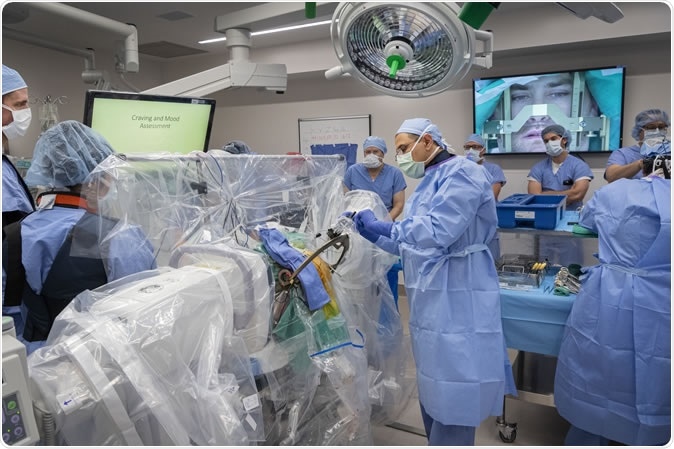
WVU Medicine Dr. Ali Rezai, executive chair of the Rockefeller Neuroscience Institute, asks questions and receives answers from DBS patient Gerod Buckhalter. The answers guide adjustments to the DBS implant. November 1, 2019. (WVU Photo/Greg Ellis)
The technology is not new - it is a deep brain stimulation (DBS) device that sends impulses via very small electrodes into the specific regions of the brain that are involved in creating addictions and in self-control behaviors. This tiny chip will provide information about real-time cravings; it will also be manipulated by scientists to arrest these cravings by sending counter-impulses to this region. The inputs will help scientists understand more about how the brainwaves change in cases of refractory opioid addiction.
Deep brain stimulation
Drug addiction is a growing public health concern with the changeover to extremely permissive and self-centered lifestyles in many parts of the world. The problems involves both legally prescribed drugs like opioids which are used for pain control in both acute and chronic situations, as well as illicit drugs like heroin. Despite many types of medical, psychological and rehabilitation therapy.Opioid addiction is primarily treated by counseling coupled with alternative pain-relieving drugs that can be used to alleviate pain. However, for those in whom other approaches have proved ineffective, DBS could be the only way out of this life-threatening condition.
DBS is an approved therapy for several conditions, including epilepsy, essential tremor, dystonia and obsessive-compulsive disorder (OCD). Addiction is primarily a disease of the brain reward circuits, which become programmed to respond to opioids and then to motivate opioid-taking behavior.
This manifests as a combination of strongly compulsive seeking for the drug of addiction, with consumption when found, coupled with a progressive lack of control over the use of the drug. Both health and social status suffer as a result of such addiction.
Heroin and opioids are the drugs most commonly and heavily abused among all illicit drugs. Opioid addiction is also a public health issue due to the overuse of such drugs by physicians and other health providers for pain in some developed countries. The researchers in the current team have already gathered a lot of experience on using DBS to treat these conditions before attempting to extend its use in the present trial.
The nucleus accumbens and DBS
The trial
The first participant is a 33-year old man with over 10 years of addiction to opioids and benzodiazepines, having overdosed several times and with a history of multiple relapses following treatment. The trial will first have 4 participants, who have failed to recover from addiction despite completing several types of treatment programs at West Virginia University Medicine. This includes counseling, social recovery programs, residential, inpatient and outpatient programs.Another similar trial of DBS in 60 patients with refractory opioid dependence is underway in China, as reported in the BMJ Openin 2019. This is proposed to be a prospective trial to assess its efficacy and safety when performed bilaterally on the nucleus accumbens and anterior limb of the internal capsule.
Implications
The high-tech nature of this intervention is a definite disadvantage, but it could prove its worth as a last-ditch intervention in people without any other hope of recovery. Researcher and addiction specialist James Berry said, “Despite our best efforts using current, evidence-based treatment modalities, there exist a number of patients who simply don’t respond. Some of these patients remain at very high risk for ongoing catastrophic health problems and even death. DBS could prove to be a valuable tool in our fight to keep people alive and well.”
https://wvutoday.wvu.edu/stories/2019/11/05/wvu-rockefeller-neuroscience-institute-first-in-u-s-to-use-deep-brain-stimulation-to-fight-opioid-addiction






No comments
Post a Comment